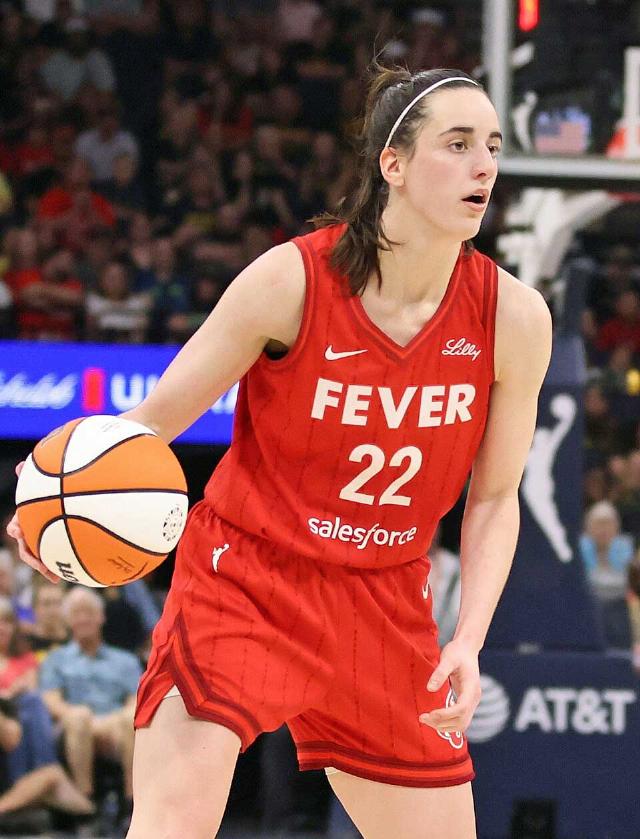Can the WNBA act in its own interest?
Children trained in a variety of sports learn the aphorism: “there is no “I” in team.” That they must use their talents while subordinating their egos for the good of their team is relentlessly drilled into them. They quickly learn there are always others bigger, faster, stronger and more talented and if their coaches are people of common sense and integrity, they’re also taught they should appreciate those people because they make the team stronger.
Coaches also say playing sports is all about building character, about learning to work and play with others, which inevitably takes a backseat to winning.
That’s why study of Caitlin Clark and the WNBA is such a useful morality tale.

Graphic: Caitlin Clark Fever 2 by John Mac via Wikimedia Commons (cropped) is licensed under CC BY-SA 2.0 Generic
Prior to Clark, the WNBA was the fringiest of fringe sports. On pain of death, few, if any Americans could name a single player. Now they can name at least one. Almost immediately upon joining the league, she single-handedly raised interest, and revenue, to previously unimagined levels. Suddenly, athletes making a pittance could see a future of increased salaries and perhaps even lucrative endorsement deals. Clark is the tide raising all boats.
But how could a single athlete do that? In his 1992 movie, Leap of Faith, Steve Martin said you never mess with the genuine article. That’s Caitlin Clark. She has it all. She’s pretty, smart, reads the court like no one else, has every skill required, is relentlessly hard-working, is a born leader, and is genuinely nice. She passes the ball, helps her teammates score and as a guard routinely makes rebounds. People are watching the WNBA in record numbers because she’s the genuine article, and she has made her team a winner.
That’s why the league hates her. That’s why they’re constantly trying to injure her. She’s not black or lesbian—look in the dictionary under “white girl” and you’ll find her picture--and she’s just that good. She’s merit personified, and while the better angels of their nature tell other players they ought to appreciate and be grateful for her, the ugly side of human nature—greed, jealously, petty hatred, even racism—has overwhelmed them.
With Clark out for several weeks with a quad injury, TV ratings nosedived:
The Fever’s nationally televised games are down 53 percent — averaging 1,810,000 viewers with Clark compared to 847,000 without her,” the New York Post reported today.
The Fever has also seen its win record diminished. Without Clark in the van, they have fallen to a 4-5 record.
The conclusion of that article had to drive Clark haters insane:
In the end, it is increasingly evident that women’s basketball is still an afterthought on the sports scene without Caitlin Clark on sports fans’ screens.
Imagine the self-hating rage of players upon Clark’s first game back against the undefeated New York Liberty. Any pretense Clark wasn’t the league’s essential player vanished:
Clark lit up the scoreboard in her return from injury, and the Indiana Fever beat the reigning WNBA champions, 102-88.
The Liberty, who entered the game at 9-0, led by as many as 11 in the first quarter, but then Caitlin Clark happened. Clark missed five games after injuring her quad against this same Liberty team three weeks ago, but she hardly looked rusty.
Clark sunk 32 points, had nine assists and eight rebounds. With Clark on the court, her teammates play better. Fans responded because Caitlin Clark revives memories of their basketball days. Not only that, they know they’re seeing the genuine article, a rare talent who plays pure basketball, who plays the game the way it ought to be played. Outkick agrees:
In 2024, the WNBA recorded its most-watched regular season in 24 years. However, the top 16 most-watched games all featured rookie sensation Caitlin Clark.
And that may not be healthy:
Rather than embracing the golden goose, many of the WNBA players met Clark's popularity with fierce resentment. Players like Angel Reese, Chennedy Carter, and DiJonai Carrington hard-fouled her on the court, mocked her on social media, and dismissed her popularity as a product of white privilege.
This is on point:
The catty mean girl act doesn't sell.
By all accounts, the WNBA is on track to squander its moment. If the WNBA doesn't find a way to tone down the anti-Clark jealousy and animosity, the league is not going to grow beyond just one player.
My Kendo—Japanese fencing—sensei taught that when beaten, the only thing to do was to bow and say: “thank you for teaching me I must be better.”
A little of that humility could go a long way toward building the WNBA. Now we see if the rest of the league can recognize and act on that.
On a different subject, if you are not already a subscriber, you may not know that we’ve implemented something new: A weekly newsletter with unique content from our editors for subscribers only. These essays alone are worth the cost of the subscription.
Mike McDaniel is a USAF veteran, classically trained musician, Japanese and European fencer, life-long athlete, firearm instructor, retired police officer and high school and college English teacher. He is a published author and blogger. His home blog is Stately McDaniel Manor.